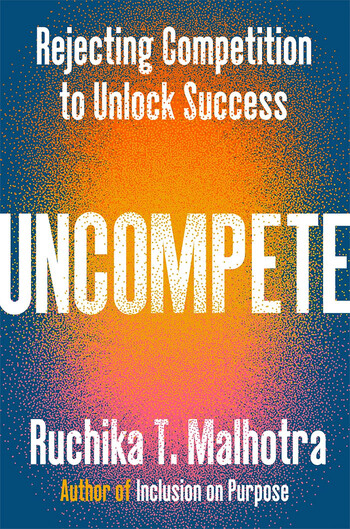Competition is all around us, and while many view it as positive and natural, journalist and inclusion strategist Ruchika T. Malhotra ’10JRN argues that it can be detrimental to ourselves and society. In her bestselling new book, Uncompete, she touts the benefits of collaborating over competing, and gives concrete strategies for how to do it.
How did you become interested in competition? What inspired you to write this book?
Uncompete draws from various facets of my life — personal, professional, and academic — all of which have been defined in various ways by competition. Growing up in Singapore, which has become known as a financial juggernaut, I was raised to believe that our country rose to this position in the world because we worked harder than anyone else. Those values were certainly instilled in me at home as well.
I went to the London School of Economics for my undergraduate work and then Columbia for my master’s degree. I think many people who are accepted into these elite schools believe that they’ve gotten in because they are better or smarter or have worked harder than other people. Then, when they get there, their sense of self begins to erode and they feel like they have to fight to get it back. Similarly, in the workplace, I was pitted against other women and made to believe that I wouldn’t get ahead if I didn’t outcompete them.
I began to wonder about our hyper-competitive society — how we’ve gotten to this point, and whether competition actually does drive success, as I’d always been taught. After years of research, I concluded that the opposite was true.
So we’re not naturally competitive? Is this all taught or engrained by society?
I haven’t been able to find any research that indicates that we are hard-wired to compete. We are hard-wired to compare. Biologically, we need to be able to look at another person and assess whether they’re a predator or whether they should be added to our tribe. But that’s different than competition.
The idea of natural selection has been around since the mid-1800s, which I think has contributed to the idea that we are biologically competitive — those that survived are the ones that “won.” But new research also indicates that what has allowed us to be successful as a society is the ability to collaborate. We made it out of the Stone Age not because it was survival of the fittest, but because we were able to work together to problem solve.
Historically, competition has arisen out of scarcity — there’s only so much to go around, so we have to fight to get what we want. You argue that’s not true — can you walk me through that?
It’s certainly true that competition arises out of perceived scarcity. But much of that scarcity in modern society is manufactured. It’s designed to keep us feeling stressed, feeling like we have to out-do others to succeed. For example, a developer will only build a finite number of homes in a certain area so that people will out-bid each other and drive prices up. Companies are structured in such a way that there’s only one CEO, only one leader at every step of the org chart. It’s meant to encourage hustle culture, but it’s also playing with our mental health, causing burnout, and contributing to the loneliness epidemic. Most experts agree that even a dire problem like world hunger is not due to a lack of resources, but rather a lack of international cooperation.
When we’re able to re-imagine these systems — looking at co-leadership or co-CEO models in business, for example — we’ve found that we can lower the wage gap, encourage labor sharing, and ultimately be more successful than with a more hierarchical structure.
You argue that competition most adversely impacts groups who are already disadvantaged — women and people of color. Why is that and how do we work against it?
This is probably the part of the book that I feel most strongly about, and that I hope readers will take the most from. Competition very much exacerbates existing oppressions in society, and creates less solidarity for people with shared challenges.
“Divide and rule” has long been an intentional strategy used by people in power to keep groups disenfranchised. In male-dominated industries, for example, the few women are often pitted against each other. The same can be true for underrepresented racial groups. The result is that we see people who we should be supporting and collaborating with as adversaries. This kind of thinking is sometimes billed as beneficial for everyone because competition boosts productivity across the board, but in reality, it only benefits those who are already in power.
In my job as an inclusion strategist, I often hear what’s called zero-sum thinking: the idea that if your group makes gains, it’s at the cost of my group’s success. But again, this kind of scarcity mentality is misguided. In my work I have seen firsthand that at companies that discourage this kind of zero-sum thinking and prioritize diversity, the workplace is better and more productive for everyone.
You lay out an 8-pronged approach to reducing competition — the Uncompete plan. Many of those pillars require societal change, like rethinking leadership structures. What are some action items for individuals? How do we push this kind of change forward?
I think everything, even collective action, is made up of individual action, and I tried to design the book in a way that readers could take that action as soon as possible. One way that I think we can adjust our own behavior is to think about the ways that we compare ourselves to others.
Everyone experiences envy. But psychologists talk about two kinds of envy — malicious envy and benign envy. Malicious envy comes from a place of grievance: when you see that someone else has succeeded, you think, “that’s not fair” or “they didn’t deserve it.” You might think about ways to sabotage their success, like leaving a nasty comment on their Instagram or making disparaging remarks about them to others.
Benign envy, on the other hand, allows you to look at someone else’s success and learn from it. Think about how they achieved the goal that you are envious of, and then think about what you need to incorporate into your own life to achieve a similar goal. Rather than thinking about how to take someone else down, you think about how to lift yourself up.
Relatedly, one aspect of the Uncompete plan that I really liked was radical generosity. Can you explain what that is?
For me, radical generosity means practicing generosity without the belief that it’s going to be reciprocated. It’s essentially eliminating quid pro quo: I did something for this person, so they should do something for me. Of course, when people see that you’ve behaved generously, often they will reciprocate, or they’ll pay it forward — both of which are beneficial to society. For example, sharing information about your salary with a colleague so that they are better prepared when going into a salary negotiation for themselves has no direct benefit to you. But they might do the same for another colleague and so on, and the result is a more open and supportive workplace. I think it’s one of the most practical, and in some ways one of the most radical, ways to reframe the world.
Is there a way to be competitive without being hyper-competitive? Can we turn down the volume without eliminating competition entirely — for example, can we still enjoy games and sports? Or do you think all competition is dangerous?
Absolutely. Despite the title, we obviously can’t eliminate competition entirely, so I think turning down the volume is a great way to put it. Sports is a good example of a place where there can be healthy competition and it can be wonderful, if you set up the norms to be as equal as possible and play a good-natured game. In the real world, of course, nothing operates with that sort of perfect playing field.
What is your advice to parents? How can we instill these values in our children while still encouraging them to succeed?
I am a parent myself, to a nine-year-old boy, and this is an area where I admit I’m still learning. Or, rather, I’ve had to do a lot of un-learning and am still working on that. As the child of immigrant parents, I was definitely taught that the more I excelled, the better position I would be in society. Of course, I also want my son to succeed, so I’ve had to take my own medicine, which is hard.
I think one way that we can nurture and nourish our kids without emphasizing competition is to lean into learning and cultivating a growth mindset (making them into well-rounded people) rather than a fixed mindset (hyper-focusing on things that they show skills in). So, for example, my son showed an early aptitude for and interest in mathematics. My instinct was to immediately find extended math classes and competitions for him. Instead, we made a deliberate decision to encourage his interest in math, but also focus on things he struggled with, like swimming or sports. We need to get kids really good at being ok with failing, at learning from those failures, and at not deriving their whole sense of self-worth from winning.





